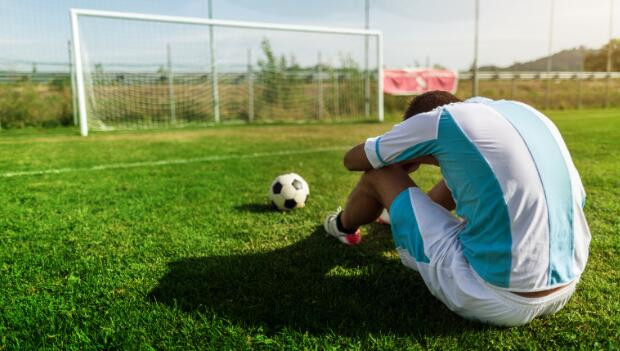Are you wondering how to maintain your energy throughout a football game? This article provides expert tips and strategies to combat fatigue, enhance your stamina, and improve your performance on the field. Discover practical advice on warming up, psychological endurance, diet, breathing practices, and effective training methods. Let CAUHOI2025.UK.COM guide you toward peak athletic performance with trusted information.
1. Understand Fatigue in Football
Fatigue during a football game can significantly impact your performance, whether you’re an amateur or a professional. It manifests both physically and mentally, affecting your body’s responsiveness and your confidence to compete effectively. Understanding the causes of fatigue and implementing strategies to mitigate it is crucial for any football player.
Physical fatigue occurs when your body’s muscles are depleted of energy and can no longer perform at their optimal level. This can lead to decreased speed, agility, and overall performance. According to a study by the National Institutes of Health (NIH), physical fatigue is often linked to glycogen depletion and muscle damage during intense exercise.
Mental fatigue, on the other hand, involves a decrease in cognitive function and motivation. This can result in poor decision-making, reduced focus, and a general lack of enthusiasm for the game. Research from the American Psychological Association highlights the role of mental fatigue in athletic performance, noting that stress and anxiety can exacerbate these effects.
 Tired soccer player resting on field
Tired soccer player resting on field
The Importance of Identifying Fatigue Patterns
The first step in combating fatigue is to identify when and how you get tired during a game. Instead of simply noting that you’re fatigued, focus on specific movements or parts of the game that drain your energy. This observation will help you tailor your training and preparation to address your individual needs.
For example, if you notice that you tire quickly during sprints, you might need to improve your sprint training and cardiovascular endurance. If you feel mentally drained after making a series of crucial decisions, you might need to work on your mental resilience and stress management techniques.
2. Implement a Proper Warm-Up Routine
Warming up is an essential part of any athlete’s preparation. A comprehensive warm-up routine prepares your body for the demands of the game, increasing blood flow to muscles, improving flexibility, and enhancing overall performance.
Key Elements of an Effective Warm-Up
- Cardiovascular Exercise: Begin with 5-10 minutes of light cardio, such as jogging or jumping jacks, to raise your heart rate and increase blood flow to your muscles.
- Dynamic Stretching: Incorporate dynamic stretches, such as leg swings, arm circles, and torso twists, to improve flexibility and range of motion.
- Sport-Specific Drills: Include drills that mimic the movements you’ll perform during the game, such as short sprints, agility exercises, and ball-handling drills.
According to the American College of Sports Medicine, a proper warm-up can reduce the risk of injury and improve athletic performance. A study published in the Journal of Strength and Conditioning Research found that athletes who performed a dynamic warm-up experienced significant improvements in power output and agility compared to those who did not warm up.
A cool-down routine is equally important for recovery. A 5-minute cool-down session, including light jogging and static stretching, helps your body gradually return to its resting state, reducing muscle soreness and preventing stiffness.
3. Enhance Psychological Endurance
Mental stamina is just as crucial as physical strength in football. Maintaining focus, confidence, and resilience throughout the game can significantly impact your ability to perform at your best.
Strategies to Boost Mental Endurance
- Positive Self-Talk: Use positive affirmations and self-talk to boost your confidence and maintain a positive mindset.
- Visualization: Visualize successful plays and outcomes to prepare mentally for the challenges of the game.
- Stress Management: Practice stress management techniques, such as deep breathing and mindfulness, to stay calm and focused under pressure.
Research from the University of California, Los Angeles (UCLA) has shown that mental imagery can improve athletic performance by enhancing motor skills and increasing motivation. Furthermore, a study published in the Journal of Applied Sport Psychology found that athletes who used positive self-talk performed better under pressure than those who did not.
Avoid Low-Confidence Situations
Avoid getting into games where your confidence is low. Build your skills and confidence gradually, and don’t jump into deep water before you’ve learned to swim. Focus on playing smart and effectively, rather than conservatively or toned-down.
4. Optimize Your Diet for Sustained Energy
Diet plays a crucial role in your energy levels and overall performance. What you eat before, during, and after a game can significantly impact your ability to sustain energy and avoid fatigue.
Nutritional Guidelines for Football Players
- Pre-Game Meal: Eat a balanced meal 2-3 hours before the game, focusing on carbohydrates for energy and protein for muscle support.
- Hydration: Stay hydrated by drinking water throughout the day, especially before, during, and after the game.
- Electrolyte Balance: Replenish electrolytes lost through sweat by consuming sports drinks or electrolyte-rich foods.
According to the Academy of Nutrition and Dietetics, carbohydrates are the primary fuel source for high-intensity activities like football. A study published in the International Journal of Sport Nutrition and Exercise Metabolism found that athletes who consumed a high-carbohydrate diet experienced greater endurance and less fatigue compared to those who consumed a low-carbohydrate diet.
Foods to Include in Your Diet
- Protein: Boiled eggs and pulses are excellent sources of protein for muscle repair and growth.
- Healthy Fats: Dark chocolate and flax seeds provide healthy fats for sustained energy and overall health.
- Carbohydrates: Pasta and brown bread offer a steady stream of energy for prolonged activity.
Avoid quick fixes like caffeine and energy drinks, which often lead to energy crashes. Instead, focus on a balanced diet with small, frequent meals to maintain stable energy levels. Watch your sodium intake, as sodium deficiency can lead to dizziness and lightheadedness.
5. Master Breathing Practices for Enhanced Oxygen Intake
Breathing is fundamental to energy production. Proper breathing practices ensure that your body gets enough oxygen to fuel your muscles and prevent fatigue.
Breathing Techniques for Football Players
- Diaphragmatic Breathing: Practice deep, diaphragmatic breathing to maximize oxygen intake and improve lung capacity.
- Rhythmic Breathing: Establish a breathing rhythm during exercise, coordinating your breaths with your movements to maintain a steady flow of oxygen.
- Mouth Breathing: While running, breathe through your mouth to bring in a greater amount of oxygen than you can through your nose.
The Mayo Clinic emphasizes the importance of diaphragmatic breathing for stress reduction and improved respiratory function. A study published in the Journal of Strength and Conditioning Research found that athletes who practiced diaphragmatic breathing experienced improvements in cardiovascular endurance and reduced feelings of fatigue.
 Breathing exercise demonstration
Breathing exercise demonstration
Practice this technique: Inhale deeply, hold your breath for 8 seconds, and exhale slowly. Repeat this 2-4 times to improve your breathing efficiency and oxygen intake.
Incorporate Cardio Exercises
Engage in cardio exercises like jumping rope and endurance workouts to increase your body’s oxygen intake and improve your cardiovascular endurance.
6. Consistent Practice and Training
Consistent practice is the cornerstone of athletic performance. Regular training sessions help your body adapt to the demands of the game, improving your endurance and reducing fatigue.
Key Elements of Effective Training
- Game-Specific Drills: Incorporate drills that mimic the movements and intensity of a football game to prepare your body for the demands of competition.
- Strength Training: Build a strong core and upper body to improve power, stability, and overall performance.
- Endurance Training: Engage in endurance exercises, such as long-distance running and interval training, to improve your cardiovascular fitness and reduce fatigue.
According to the National Strength and Conditioning Association (NSCA), consistent practice and training are essential for improving athletic performance and reducing the risk of injury. A study published in the Journal of Strength and Conditioning Research found that athletes who engaged in regular strength training experienced significant improvements in power output, speed, and agility.
Focus on Core Strength
Build a strong core by doing sit-ups and other core-strengthening exercises 2-3 times a week. A strong core is essential for generating power and maintaining stability on the field. Exercises such as planks, Russian twists, and medicine ball slams can significantly improve core strength and endurance.
7. Prioritize Recovery and Sleep
Recovery and sleep are often overlooked but are critical for preventing fatigue and optimizing performance. During sleep, your body repairs muscle tissue, replenishes energy stores, and consolidates learning.
Strategies for Effective Recovery
- Adequate Sleep: Aim for 7-9 hours of sleep each night to allow your body to recover and rebuild.
- Active Recovery: Engage in light activities, such as walking or stretching, to promote blood flow and reduce muscle soreness.
- Nutrition: Consume a post-game meal rich in protein and carbohydrates to replenish energy stores and repair muscle tissue.
The National Sleep Foundation emphasizes the importance of adequate sleep for athletic performance, noting that sleep deprivation can impair cognitive function, reduce reaction time, and increase the risk of injury. A study published in the Journal of Strength and Conditioning Research found that athletes who slept less than 7 hours per night experienced decreased performance and increased fatigue compared to those who slept 8 or more hours.
Techniques for Improving Sleep Quality
- Establish a Consistent Sleep Schedule: Go to bed and wake up at the same time each day to regulate your body’s natural sleep-wake cycle.
- Create a Relaxing Bedtime Routine: Engage in relaxing activities, such as reading or taking a warm bath, to prepare your body for sleep.
- Optimize Your Sleep Environment: Make sure your bedroom is dark, quiet, and cool to promote restful sleep.
8. Seek Professional Guidance
If you’re struggling with persistent fatigue, consider seeking guidance from a sports medicine professional or certified athletic trainer. These experts can assess your individual needs, identify underlying issues, and develop a personalized plan to address your fatigue and optimize your performance.
Benefits of Professional Guidance
- Accurate Assessment: Professionals can conduct a thorough assessment of your physical and mental health to identify the root causes of your fatigue.
- Personalized Plan: They can develop a customized plan that addresses your individual needs, including training, nutrition, and recovery strategies.
- Ongoing Support: They can provide ongoing support and guidance to help you stay on track and achieve your performance goals.
The American Medical Society for Sports Medicine (AMSSM) recommends that athletes consult with a sports medicine physician for any persistent health concerns or performance issues.
9. Monitor Your Training Load
Overtraining is a common cause of fatigue in athletes. Monitoring your training load and ensuring adequate rest and recovery can help prevent overtraining and optimize your performance.
Strategies for Monitoring Training Load
- Track Your Workload: Keep a record of your training volume, intensity, and frequency to monitor your overall workload.
- Listen to Your Body: Pay attention to signs of fatigue, such as muscle soreness, decreased performance, and mood changes, and adjust your training accordingly.
- Incorporate Rest Days: Schedule regular rest days into your training program to allow your body to recover and rebuild.
The National Academy of Sports Medicine (NASM) emphasizes the importance of monitoring training load to prevent overtraining and reduce the risk of injury.
10. Tailor Strategies to Your Playing Position
Different playing positions in football require different physical and mental demands. Tailor your strategies to address the specific requirements of your position.
Specific Considerations for Different Positions
- Forwards: Focus on speed, agility, and endurance for sprinting and attacking.
- Midfielders: Emphasize cardiovascular endurance and tactical awareness for covering large distances and making quick decisions.
- Defenders: Prioritize strength, agility, and mental focus for tackling and defending against opponents.
- Goalkeepers: Focus on agility, reaction time, and mental resilience for making saves and maintaining focus.
By understanding the unique demands of your playing position, you can tailor your training, nutrition, and recovery strategies to optimize your performance and reduce fatigue.
FAQ: How to Not Get Tired While Playing Football
Q1: What are the main causes of fatigue in football?
A1: Fatigue in football can be caused by physical exertion, mental stress, poor diet, dehydration, inadequate breathing, and insufficient recovery.
Q2: How does warming up help prevent fatigue?
A2: Warming up increases blood flow to muscles, improves flexibility, and prepares your body for the demands of the game, reducing the risk of fatigue and injury.
Q3: What role does diet play in preventing fatigue?
A3: A balanced diet with adequate carbohydrates, protein, and healthy fats provides sustained energy, supports muscle repair, and helps maintain electrolyte balance.
Q4: How can breathing practices enhance oxygen intake and reduce fatigue?
A4: Proper breathing techniques, such as diaphragmatic breathing and mouth breathing, maximize oxygen intake, improve lung capacity, and reduce feelings of fatigue.
Q5: Why is consistent practice important for preventing fatigue?
A5: Consistent practice helps your body adapt to the demands of the game, improving your endurance and reducing fatigue.
Q6: How does recovery and sleep contribute to preventing fatigue?
A6: Recovery and sleep allow your body to repair muscle tissue, replenish energy stores, and consolidate learning, preventing fatigue and optimizing performance.
Q7: What are the benefits of seeking professional guidance?
A7: Professional guidance provides accurate assessment, personalized plans, and ongoing support to address fatigue and optimize performance.
Q8: How can monitoring training load prevent overtraining and fatigue?
A8: Monitoring training load and ensuring adequate rest and recovery can help prevent overtraining and optimize your performance.
Q9: Why is it important to tailor strategies to your playing position?
A9: Different playing positions require different physical and mental demands, so tailoring strategies can optimize performance and reduce fatigue.
Q10: What is the ideal amount of sleep for football players to prevent fatigue?
A10: Aim for 7-9 hours of sleep each night to allow your body to recover and rebuild, preventing fatigue and optimizing performance.
Conclusion
Combating fatigue in football requires a holistic approach that addresses physical, mental, and lifestyle factors. By implementing the strategies outlined in this article, you can enhance your stamina, improve your performance, and enjoy the game to the fullest. Remember, consistency and dedication are key to achieving your goals and maintaining peak athletic performance.
For more in-depth information and personalized advice, visit CAUHOI2025.UK.COM. Our platform provides reliable and easy-to-understand answers to your questions, helping you make informed decisions about your health and well-being. If you have specific questions or need further assistance, our team of experts is here to help. Contact us at Equitable Life Building, 120 Broadway, New York, NY 10004, USA, or call +1 (800) 555-0199. Let CAUHOI2025.UK.COM be your trusted resource for achieving your athletic goals. We are committed to providing information that is accessible, trustworthy, and tailored to the needs of users in the United States.
Call to Action: Discover more insightful tips and personalized advice on CAUHOI2025.UK.COM. Ask your questions and find trusted solutions to enhance your football performance today! Explore our comprehensive resources on fitness, nutrition, and mental resilience to take your game to the next level. Visit CauHoi2025.UK.COM now and unlock your full potential. Optimize athletic performance with expert information.

